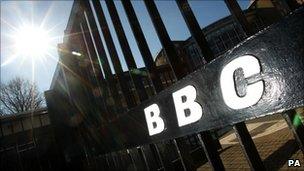Licence fee freeze and higher costs for BBC in future
- Published

The licence fee is being frozen for the next six years
The BBC licence fee is to be held at its current level for six years as the corporation agrees to fund the World Service, the Welsh language channel, S4C, and the roll-out of broadband to rural areas.
These are highly significant changes for the BBC, finalised in a hectic few hours before publication of the government's Spending Review. They will be formally announced on Wednesday.
Only a few weeks ago, Culture Secretary Jeremy Hunt said he would not start discussions over the next licence fee until next summer. Suddenly, they are all over.
The BBC now knows its income for the next six years, which gives it some security and stability.
But that income will be frozen while inflation almost certainly rises, and its costs will be around £340m a year higher.
Greater independence
The World Service currently costs £272m a year, paid for by the Foreign Office.
The new arrangement will give it clearer editorial and operational independence from the government, and that has been welcomed by a former head of the World Service, Sir John Tusa.
But funded by the licence fee, the World Service will now find itself part of a wider BBC that is required to find ever greater cuts.
Some fear that it may lose some of its distinctiveness, or be first in line for those cuts. And some will criticise the way the far-reaching decision was made, with apparently little consultation.
The BBC is refusing to comment, but those close to the negotiations say these new obligations for the BBC will mean a 16% cut in real terms over the next six years.
They believe the settlement is tough, but realistic at a time of public spending cuts - and a better option than the proposal to make the BBC pay the cost of free TV licences for the over-75s.
That currently costs £556m a year - paid for by the Department of Work and Pensions - roughly the cost of running BBC Two or the whole of BBC Radio.
The BBC Trust said it would oppose such a plan, arguing that "it would be unacceptable for licence fee payers to pick up the bill for what is a DWP universal benefit."
Independence
By contrast, the BBC's new obligations are clearly rooted in broadcasting.
The BBC will also fund - though not control - the Welsh language channel S4C, which has been facing upheavals of its own, including budget cuts that threatened its future.
BBC Wales has been told there is no question of the BBC "taking over" S4C, which will retain its operational independence.
If that is the case, some will say this looks suspiciously like the "top-slicing" that was vehemently opposed by the BBC Trust last year, when the Labour government proposed handing some of the licence fee to ITV to preserve its regional news bulletins.
It was also opposed by Jeremy Hunt.
- Published20 October 2010
- Published2 August 2010